A
Age restrictions
You have to be over 21 to drink alcohol. Even if you are considerably older than that you should carry photo identification with you. If you cannot prove your age you will not be served.
Many of the rides in theme parks specify height restrictions. Check the relevant website for details.
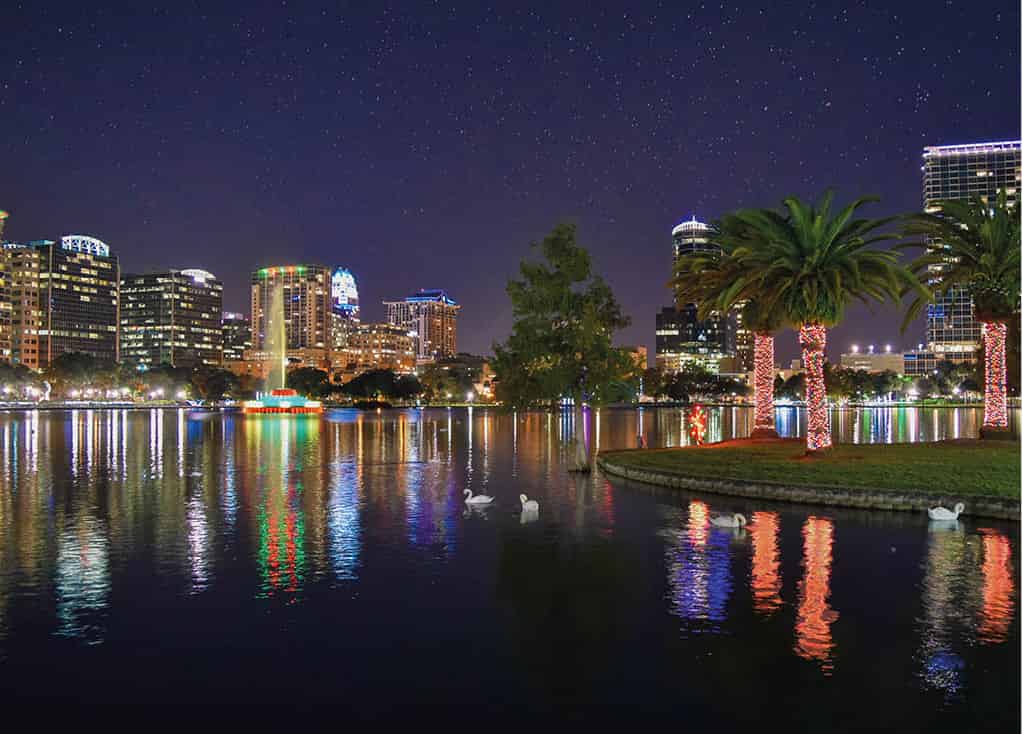
Downtown Orlando and Lake Eola lit up by night
iStock
B
Business hours
Outside the resorts most businesses are open from 9am or 10am to 5pm or later, with many of the shopping malls opening at 10am and remaining open as late as 10pm. Many large supermarkets, like Walmart, and a few restaurants, stay open 24 hours.
Banks usually remain open until at least 4pm from Monday to Thursday, and until 6pm on Friday. Some banks are open for a short time on Saturday.
During some public holidays local banks, businesses and stores may close.
C
Climate
Central Florida has a subtropical climate with high humidity. Summer daytime temperatures average 80°F–90°F (27°C–32°C) but can feel much hotter in July and August with humidity levels often in the high 90s. Winter weather is dry and temperate with daytime temperatures averaging 71°F–80°F (22°C–27°C), though they can drop surprisingly low at night.
Between May and September (especially June and July) heavy thunderstorms occur almost every afternoon but they are usually short in duration. Florida is unofficially dubbed the ‘lightning capital of the country’ because of the amount of strikes. The worst-hit area is west of Orlando by the Gulf Coast, but all of Central Florida receives its abundant share.
If you see a storm approaching, take cover. If you are in a car stay inside until the storm passes; many lightning victims are killed when getting into or out of their cars. If you are in a building do not ‘make a run for it.’ Do not use an umbrella during a lightning storm. Boaters should head for the nearest place they can tie up and evacuate the boat. During any nearby lightning storm parks will close their outdoor attractions.
Florida ranks eighth on the list of US states with the most tornadoes per year. However, they are not nearly as bad as the twisters that assail the Midwest. June to November is hurricane season in Florida. Orlando is more protected from hurricanes than the coastal cities.
Clothing
Theme parks require a great deal of walking so be sure to bring comfortable shoes. If you plan on visiting a water park bring water shoes as well. Heavy rains occur daily in June and July so pack a rain poncho; umbrellas attract lightning and are therefore discouraged. Temperatures can get chilly in mid-winter so pack accordingly. Dress is casual in all but the highest-end restaurants.
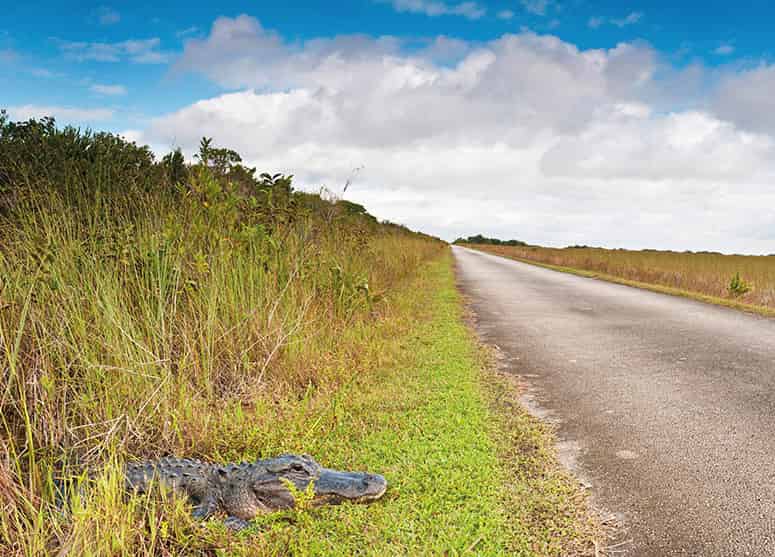
Look out for alligators
iStock
Crime and safety
Although Orlando is not a high crime area it pays to take the same precautions you would take in any city. Watch your wallet or handbag in crowded places and never leave valuable items unattended. Keep money and jewelry in your hotel safe. Keep the hotel room and patio doors locked even when you are in the room. Don’t open the door unless you know who is there; use the safety chain or check with the front desk if in doubt.
When driving keep doors locked and only park in well-lit areas. Never leave valuables in your car. If you have to, cover them up.
Theme parks conduct bag searches for all visitors and generally have good security.
Never approach or try to feed wildlife, especially alligators. Watch where you step when walking near a lake shore or a wetland area.
Customs regulations
There is no limit on the amount of money that you may bring in or take out of the US. However, you must declare amounts exceeding $10,000 or the foreign currency equivalent.
Customs allowances
Alcohol: Visitors over the age of 21 are permitted to bring in 34fl oz (1 liter) of alcohol for their personal use. Excess quantities are subject to duty and tax.
Cigars and cigarettes: Visitors may bring in no more than 200 cigarettes (one carton) or 100 cigars as part of their $800 duty exemption. An additional 100 cigars may be brought in under the gift exemption.
Gifts: As a visitor to the US you can claim on entry up to $100 worth of merchandise, free of duty and tax, as gifts for other people. Such articles may have to be inspected so do not gift-wrap them until after you have entered the country.
Prohibited goods
Articles that visitors are forbidden to take into the US include these: dangerous drugs, obscene publications, hazardous articles (e.g. fireworks) and narcotics.
Travelers using medicines containing narcotics (such as tranquilizers or cough medicine) should carry a prescription and/or a note from their doctor and should only take the quantity required for their stay. The medicine must be in its original container and clearly labelled. The medication must also be a legal prescription drug in the US.
Meat, poultry, fruit, vegetables, most dairy, absinthe, and more than 9 ounces (250 grams) of caviar are all prohibited.
D
Disabled travelers
Accessibility and facilities are excellent at the theme parks and other attractions in Orlando. Special parking is available near the entrances to each park, the hotels and other facilities. Visitors from outside the country can obtain a special parking permit by bringing a copy of their handicapped parking permit from home, photo ID (passport) and $15 to a Florida vehicle licensing bureau. Visit www.flhsmv.gov to find a location.
Wheelchairs are available to rent from several locations, usually near the park’s entrance. For some rides guests may remain in wheelchairs but for others they must be able to leave them. Regulations are indicated in leaflets and at the appropriate entrance. Nearly all buses can accommodate conventional wheelchairs and access is available at toilets in all the theme parks.
Guests with disabilities should request, or get online, Disney World’s ‘Guide for Guests with Disabilities,’ which spells out offerings for those with mobility, visual and hearing issues. Also online and at each park’s Guest Services window are park-specific guides. Offerings for the hearing impaired, for example, include handheld, reflective and video captioning in certain places. A sign-language interpreter is available for certain theater shows on rotating days. Those with vision impairment might want to use a handheld device with audio descriptions or Braille guidebooks and maps.
Universal Orlando, SeaWorld and Legoland all have downloadable guides with information for people with disabilities on their websites.

Florida oranges
Visit Florida
E
Electricity
You will need an adapter for British and European plugs, as well as a voltage transformer. US sockets take flat two-pronged plugs, sometimes with a third round prong. The power supply is 110–120 volts AC (60 cycles).
Embassies and consulates
Most embassies are in Washington DC. These are the nearest consulates for English-speaking countries:
Australia: (Honorary Consul, by appointment only) Law Offices of Slesnick and Casey, LLP, 2701 Ponce de Leon Boulevard, Suite 20, Coral Gables, FL 33134; tel: 786-505-6802.
Canada: 200 South Biscayne Boulevard, Suite 1600, Miami, FL 33131; tel: 305-579-1600.
New Zealand: 37 Observatory Circle, NW, Washington DC 20008; tel: 202-328-4800.
Republic of Ireland: (Honorary Consul, by appointment only) Law Offices of Terence J Delahunty, Jr P.A, 118 East Jefferson Street, Suite 203, Orlando, FL 32801; tel: 401-810-3352.
South Africa: 333 East 38th Street, 9th Floor, New York, NY 10016; tel: 212-213-4880.
UK: 1001 Brickell Bay Dr., Miami, FL 33131; tel: 305-400-6400.
Emergency numbers
For police, ambulance or fire services dial: 911.
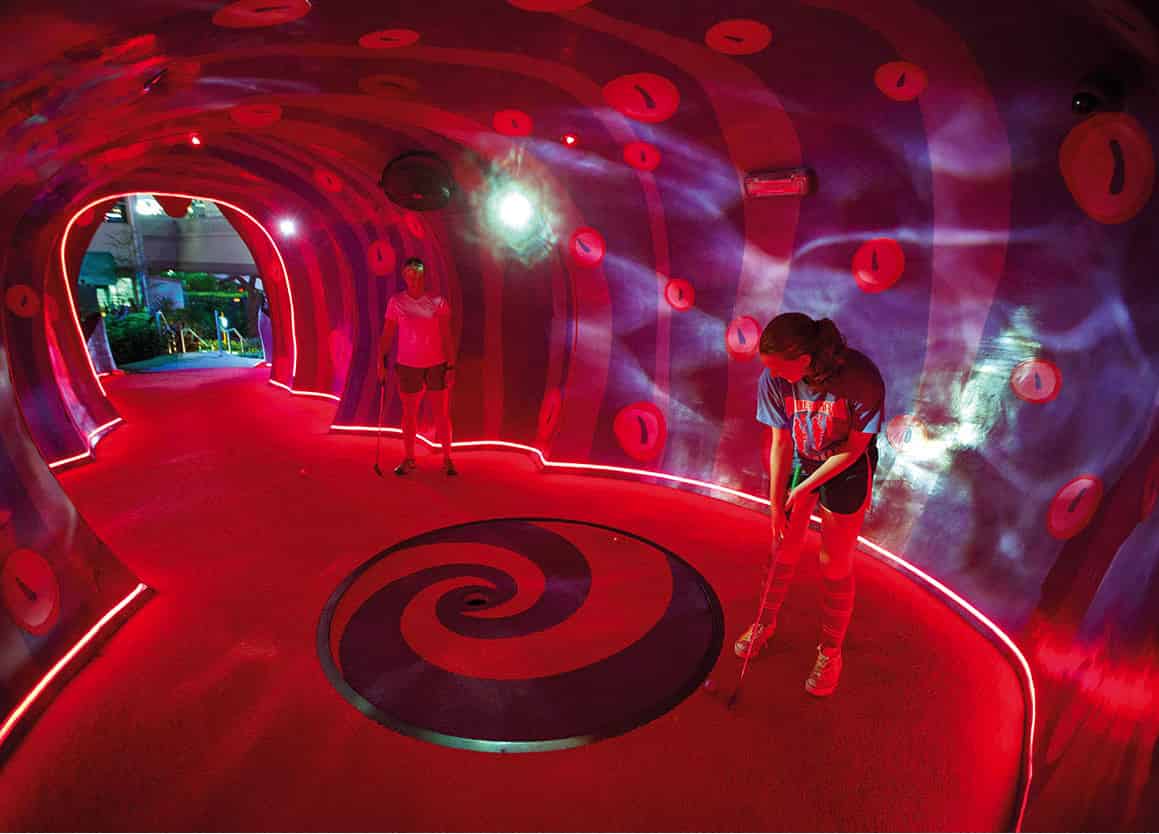
Playing mini-golf at Universal Citywalk
Scott Audette/VisitFlorida
G
Gay and lesbian travelers
For a few days every June, Orlando and its theme parks host Gay Days. Thousands of gay and lesbian travelers come to join in the special gay-oriented celebrations. For more details, visit www.gaydays.com.
Golf
Orlando has more than 150 golf courses and more than 20 golf academies, including many signature courses designed by famous golf pros. Orlando also hosts many professional golf tournaments. Visitor options range from public courses, where you can play a casual round, to all-inclusive golf resorts. For information on the range of golf resorts and facilities visit www.visitorlandogolf.com or www.golfersguide.com/orlando.
H
Health
If you need medical assistance speak to the reception staff at your hotel. The larger resort hotels may have a resident doctor; if not, the staff can help you find the nearest doctor or hospital. The Orlando area has several ‘urgent care’ walk-in clinics, where visitors need no appointment and those without insurance pay a set price for each service. CentraCare (https://centracare.org/florida), affiliated with the Florida Hospital chain, is one that has several outlets. For small medical issues many CVS (www.cvs.com/minuteclinic) and Walgreens (www.walgreens.com/topic/pharmacy/healthcare-clinic.jsp) pharmacies have clinics.
Insurance: The cost of any health care is exorbitant. Never leave home without adequate travel insurance; a minimum cover of $1 million unlimited medical cover is strongly recommended. Carry an identification card or policy number at all times to ensure you receive prompt treatment.
Pharmacies: Always bring enough prescription medicine from home to cover the length of your trip.
For over-the-counter medicines go to Walgreens or CVS; many are open 24 hours. Walmart, Target, Publix and other grocery retailers also have pharmacy sections.
Health hazards: The two most common health hazards in Orlando are sunburn and heat exhaustion; both are easily avoided. Use a high-factor sun cream and wear a hat and sunglasses.
The heat alone can be a danger, especially for the elderly or those with a pre-existing medical condition. Dehydration and salt deficiency can lead to heat exhaustion. The main symptoms are headache, weakness, light-headedness, muscle aches, cramps, and agitation. Make a point of drinking plenty of non-alcoholic fluids (before you get thirsty) and take periodic breaks in the shade or in an air-conditioned environment.
If untreated, heat exhaustion can escalate to a far more serious case of heatstroke, which means that the body’s temperature rises to dangerous levels. In addition to the symptoms listed above people suffering from heatstroke may exhibit confusion, strange behavior and even seizures. If you suspect a companion is suffering from heatstroke get that person to a cool place, apply cold damp cloths and call 911 immediately.

Fantastical Cinderella Castle
Goa Min/Visit Florida
I
Internet
There is free wireless internet access at Orlando International Airport, most hotels (in the room or public areas), many of the theme parks and coffee bars.
L
Lost property
If you lose an item at one of the theme parks check with Guest Services who will direct you to the park’s lost property office.
M
Maps
Florida tourist offices (including overseas) often distribute the Florida Official Transportation Map (www.visitflorida.com), which has city plans, free of charge. Would-be visitors can order the map in advance. You will also find a variety of free general maps showing main sections of the Orlando area at hotels and tourist centers. The Insight Flexi map of Orlando is laminated and very practical.
Media
Newspapers: The Orlando Sentinel is the city’s daily newspaper. Orlando Weekly, published on Thursdays, is the region’s alternative paper for news, opinion, arts and entertainment. The national daily, USA Today, is distributed free at many hotels.
Magazines: The monthly Orlando Magazine has interesting feature articles on the arts, entertainment, dining and general lifestyle. A good source for monthly listings and information is WhereTraveler magazine, distributed free at many hotels.
Radio: Highlights of Orlando’s many stations include WMFE 90.7 (public radio for news and information), WBDO 96.5 (news), WMMO 98.9 (classic rock), The Wolf 103.1 (country), WDBO 580 (sports) and WUCF 89.9 (jazz).
Television: Among the dozens of channels, usually accessed via cable or satellite, are Central Florida News 13 (only accessible via Spectrum cable’s Channel 13), WMFE-TV-PBS, WFTV-ABC, WKMG-CBS and WESH-NBC. Channel numbers depend on the access system.
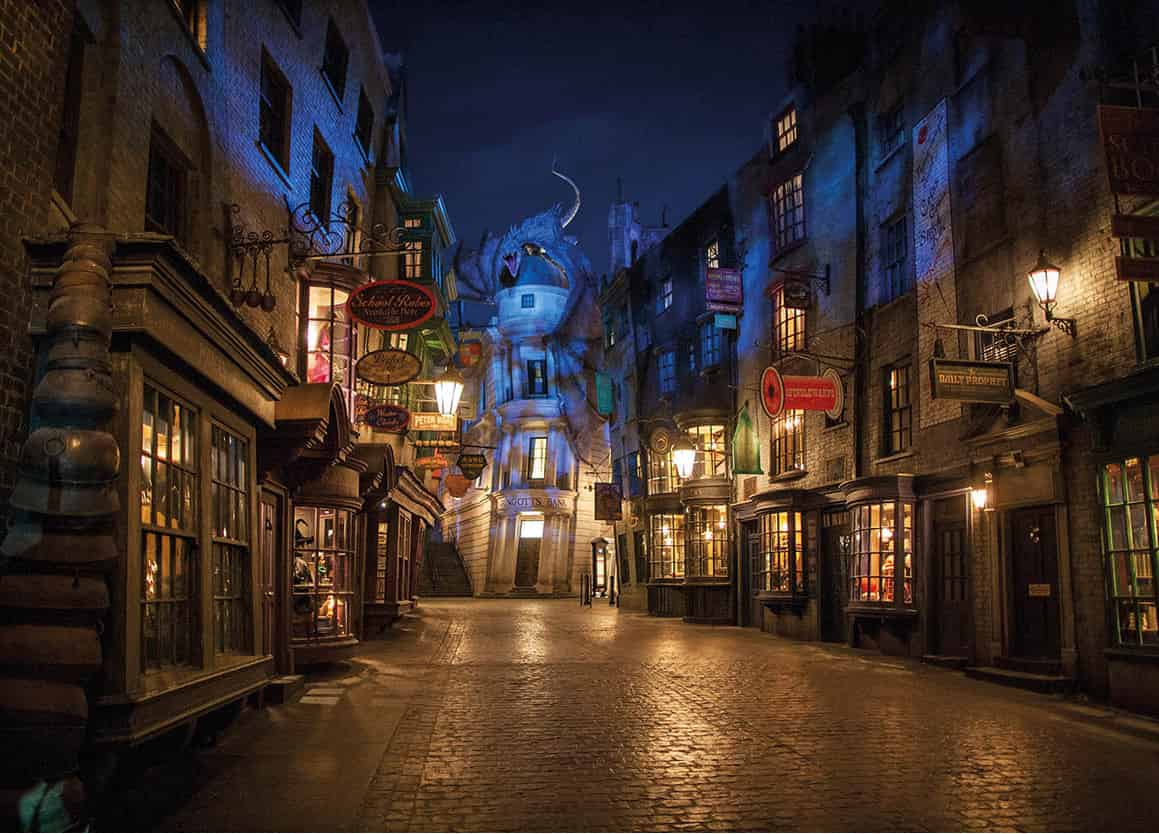
The Wizarding World of Harry Potter – Diagon Alley
Universal Orlando Resort
Money
Currency: The currency in the US is the dollar, divided into 100 cents. Coins come in denominations of 1 cent (penny), 5 cents (nickel), 10 cents (dime) and 25 cents (quarter). There are a limited number of 50-cent (half-dollar) and dollar coins in circulation. Dollar bills (notes) come in $1, $5, $10, $20, $50, $100 and $500.
Travelers’ Checks: Nearly every tourist-oriented business in Orlando accepts credit cards. Foreign visitors who prefer to use cash are advised to take US dollar travelers’ checks to Orlando. Changing foreign currency, whether as cash or checks, can prove problematic. You can seek out currency exchange facilities at busy centers like retail malls, but generally they are hard to find.
Cash Machines: You can take money out at ATM (automatic teller machine) with a debit or credit card using your PIN. Cash machines are widespread around the city. The most widely accepted cards are Visa, American Express, Mastercard, Diners Club and Discover. Maestro cards are often not accepted.
Be sure to check the rate of exchange and any other charges your financial institution may levy before using your card abroad. Some charge prohibitive rates. ATM operators usually apply a charge but you will be notified of this on-screen before you complete the transaction.
Credit Cards: Credit cards are very much part of daily life in Orlando and can be used to pay for almost everything. Car rental firms and hotels will usually take an imprint of your card as a deposit.
P
Post
Post offices: The opening hours of post offices vary between central, big-city branches and those in smaller towns, but all are open Monday–Friday (generally 8 or 9am–5pm) and some open on Saturday mornings. Supermarkets (at the customer service counter), pharmacies and hotels usually have a small selection of stamps, and there are stamp-vending machines in some transport terminals. You can also print postage online at www.usps.com.
Delivery services: For the best service choose Priority Mail Express via the US postal service. It guarantees next-day delivery within the US and delivery within two to three days to foreign destinations. Privately owned courier services, which offer next-day delivery to most places can be accessed online. Contact info for the main services are as follows:
US Postal Service: 800-275-8777, www.usps.com
FedEx: 800-463-3339, www.fedex.com/us
DHL: 800-225-5435, www.dhl-usa.com
UPS: 800-742-5877, www.ups.com
Public holidays
Jan 1 New Year’s Day
Jan (third Mon) Martin Luther King Day
Feb (third Mon) Presidents’ Day
Mar/Apr Good Friday (optional)
May (last Mon) Memorial Day
July 4 Independence Day
Sept (first Mon) Labor Day
Oct (second Mon) Columbus Day
Nov 11 Veterans’ Day
Nov (last Thu) Thanksgiving
Dec 25 Christmas Day

Mickey’s Once Upon a Christmastime Parade
Walt Disney World Resort
R
Religion
Nearly every faith and denomination is represented in Orlando. To find an appropriate place of worship, type in the denomination online and use Google Maps to find the closest matches.
S
Smoking
Smoking is not permitted in restaurants, most public buildings and areas, or at theme parks, although they all have designated smoking areas. Hotels are predominantly non-smoking, although many have smoking rooms; specify your preference when booking.
T
Taxes
A Florida sales tax of 6 percent is added to all merchandise at the sales counter except for necessary medicine and grocery items. Orange County, home to Orlando and Disney World, adds on 0.5 percent for a total sales tax of 6.5 percent. In addition, a Tourist Development tax of up to 6 percent is levied on hotel rooms. Both taxes vary by county.
Telephones
Phone numbers: US telephone numbers have a 3-digit area code followed by a 7-digit number. Area codes for the Orlando metro region are 407 and 321. You should dial all 10 digits when making a call. To call a number outside this area code you should first dial ‘1’. These calls will incur long-distance charges unless you have a national mobile-phone plan. Toll-free numbers generally have the prefix 800, 888 or 866; you may need to dial a ‘1’ when calling these numbers. Cell phone (mobile) numbers have 10 digits, the same as regular phone numbers.
Calling from abroad: To call Orlando from the UK dial 00 (international code) + 1 (USA) + the area code and number. To call other countries from the USA first dial the international code (011) then the country code: Australia 61, Germany 49, Ireland 353, New Zealand 64 and UK 44, followed by the number. Dial Canadian numbers as you would a long-distance US number.
Public telephones: Phone booths are hard to find in public areas. You are better off buying a disposable mobile phone at a retailer like Walmart or buying cards with prepaid minutes from convenience stores, service stations and other outlets.
Time zones
Orlando is on Eastern Standard Time (EST). It is 5 hours behind Greenwich Mean Time (GMT) and 3 hours ahead of Pacific Standard Time. It observes Daylight Saving Time (1 hour ahead) from mid-March through October.

Playing arcade games at WonderWorks
Willie J. Allen Jr/Visit Florida
Tipping
Service personnel expect tips in Orlando. The accepted rate for baggage handlers in airports is $5 per bag. For others, including taxi drivers and waiters, 15–20 percent is the going rate. Sometimes tips are included in restaurant bills so be sure to check carefully before adding on gratuity.
Moderate hotel tipping is around $2 per bag or suitcase handled by porters or bellboys. It is not necessary to tip chamber staff unless you stay several days. $3–5 per day is usual, depending on the state of your room and length of stay, more in high-end hotels.
Tour operators
It’s easier than ever to get around Orlando using the free Visit Orlando destination app (www.visitorlando.com/plan-your-trip/visit-orlando-destination-app), but plenty of operators will guide you around town for a day or a week, or for a select activity like a fishing excursion.
Gray Line Orlando, using the local name Gator Tours, is one such sightseeing company. It offers a city tour of Orlando, half-day and full-day tours of the local area, tours to attractions, deep-sea fishing trips and other activities; www.gatortours.com; tel: 407-522-5911.
Orlando Tours offers a huge variety of coach tours and activity tours, including airboat rides, animal and wildlife tours, boat tours, cruises, visits to all the major attractions and bus trips to other Florida cities; www.orlando-tours.com; tel: 1-800-303-5107.
American Ghost Adventures has a two-hour walking tour of haunted sites in Downtown Orlando, including a chance to conduct your own paranormal investigation using specialized equipment; http://americanghostadventures.com; tel: 407-256-6225.
Orlando Food Tours is one of a few local outfits bringing food-curious travelers to several tastings in one excursion. They are walking tours around a single food-worthy neighbourhood; www.orlandofoodtours.com; tel: 800-656-0713.
Tourist information
In Orlando: The Official Visitor Center is at 8723 International Drive, Suite 101, Orlando, FL 32819; tel: 407-363-5872; www.visitorlando.com. It is located at the corner of I-Drive and Austrian Row and is open daily from 8.30am to 6.30pm. This is a good one-stop source for information about the area where you can also pick up free maps, brochures, buy discounted theme-park and attractions tickets and book hotels. Satellite offices are located at The Mall at Millenia Concierge Desk and inside the Fort Drum and West Palm Florida’s Turnpike rest stops. You can live-chat with a specialist online 9am–5pm weekdays (www.visitorlando.com/plan-your-trip/visitor-center) and can buy tickets on the site at your leisure. Do not purchase tickets from an unauthorized vendor; the tickets may not work and you will have wasted your money.
In the UK: For a free holiday-planning kit, visit www.visitorlando.com/vacation-planning-kit. Get the Disney World version at tel: 0800-169-0730; or visit www.disneyholidays.co.uk/walt-disney-world/free-planning-tools. Universal’s can be found at www.universalorlandoresort.com/uk/dvd_order.html; SeaWorld Orlando’s is at www.seaworldparks.co.uk/order-a-free-dvd.
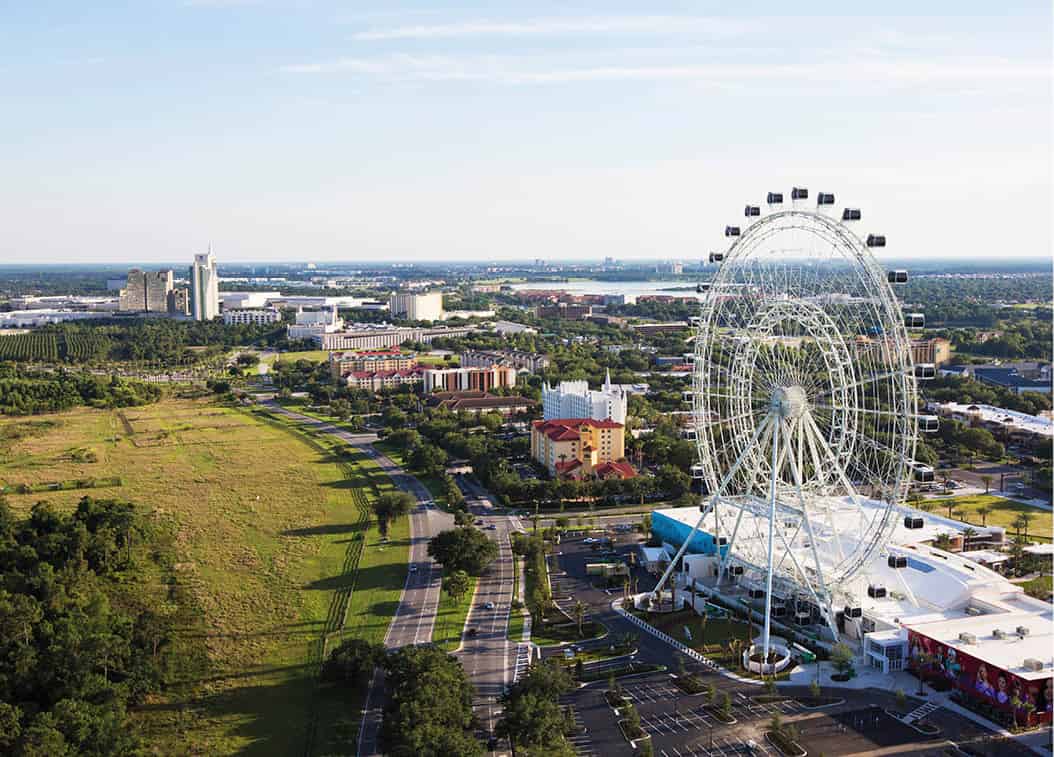
The view over the Orlando Eye and I-Drive
Song Guanhua/Visit Florida
Transportation
Arrival
By car: From the north, interstate highways I-95, I-75 and I-10 bring you into Florida. They connect with I-4, US 192, Highway 528 and the Florida Turnpike which run through the Orlando metro area. From the south, Orlando is reached via I-75, I-95 and the Florida Turnpike.
By bus: Greyhound (tel: 800-231-2222; from outside the US 214-849-8100; www.greyhound.com) provides bus services to Florida and all over the state.
By rail: Amtrak (tel: 800-872-7245; www.amtrak.com) offers slow and leisurely services from America’s Midwest, northeast and south and connecting services from points west to certain Florida cities. For those who want to take their car along they also offer an Auto Train service from Lorton Virginia to Sanford.
By air: Most major US and international carriers serve Orlando. Fare prices are competitive. Scheduled services are supplemented by charter flights, most of which fly into Orlando Sanford International Airport, about 45 minutes north of the city.
Airports
Orlando International Airport (www.orlandoairports.net): International airlines fly direct or via other US cities into Orlando International Airport, 9 miles (14km) south of Downtown Orlando and about 25 miles (40km) from Walt Disney World Resort. It has two terminals (with a third on the way). Tel: 407-825-2001 (general inquiries), 407-825-8463 (flight information).
Local buses depart from the A side of the Main Terminal on Level 1. Lynx buses 11, 42, 51, 111, 407 and 436S serve the airport. Travel time to downtown Orlando is approximately 40 minutes. Lynx bus 42 serves International Drive; travel time is around 60 minutes. Fares are $2.
Taxis are located on both the A and B sides of the Main Terminal at the Ground Transportation Level (level 1). Metered rates vary, but fares range from $35 to Downtown, $38 to International Drive, $60 to Kissimmee, and $69 to Walt Disney World.
Shuttle vans also operate from this location; fares per person range from $11–44, depending on the destination.
All the major car rental firms have facilities at the airport.
Orlando Sanford Airport (www.orlandosanfordairport.com): Most vacation charter flights arrive at Sanford Airport, about 30 miles (48km) north of Orlando. Though it’s conveniently located off I-4, the extra distance can be costly if you plan to use a taxi or shuttle bus to reach Orlando. The major car rental firms are represented at the airport. Tel: 407-585-4000.

Different modes of transport on Main Street USA
Visit Florida
Transport within Orlando
Bus: The Orlando metro area has an excellent public bus system, called Lynx. It serves most of the popular theme parks, attractions and shopping malls, as well as the airports. Bus stops are marked in pink with the paw print of a lynx cat or a bus.
A single fare is $2. An all-day pass costs $4.50. You can buy both from the bus driver but exact change is required. Seven-day and 30-day passes for unlimited rides are also available from the visitor center (for more information, click here).
Lynx usually runs every day, though some schedules change, and buses may not run on Sundays and holidays. Schedules are available at the visitor center or online at www.golynx.com. For more information, contact customer service on 407-841-5969.
The Lymmo bus system in Downtown Orlando provides free transportation around Downtown. Four routes are currently in operation: Link 60 (Orange–Downtown Line), Link 61 (Lime Line), Link 62 (Grapefruit Line) and Link 63 (Orange–North Quarter Line). Lymmo buses run on their own lanes and control their own stoplights, ensuring they are not slowed down by other traffic.
I-Ride trolley: These trolleys run to all the attractions, hotels and shopping malls along International Drive from the outlet malls south of SeaWorld up to the northernmost outlet mall. They operate daily 8am–10.30pm. Single fares are $2 and exact change is required. Children aged three to nine ride for $1. You can also buy passes for unlimited rides for three, five, seven, or 14 days (you must buy them in advance from one of the outlets listed on www.iridetrolley.com/passes.asp); they cost from $7 to $18. For more information, tel: 407-354- 5656; www.iridetrolley.com.
Taxis: Cabs are plentiful throughout the Orlando area, but they are not cheap and you need to phone in advance for pick-up. Your hotel can do this for you. Alternatively, several companies are listed in phone and online directories. Visitors with internet access often find smartphone app services like Uber (www.uber.com) and Lyft (www.lyft.com) to be easier to use and less expensive. Downtown, bicycle-driven pedicabs are a fun and inexpensive way to get around.
Car rental: Renting a car is the easiest way to explore Orlando. However, you may encounter some traffic on the major roads. If possible, avoid driving the I-4 corridor during rush hour (7–10am and 4–7pm).
Most rental agencies require you to be 21 years old (sometimes 25), have a valid driver’s license and a major credit card to rent a vehicle. Foreign travelers can use the licence issued in their home country.
Visitors wishing to rent a car upon arrival in Orlando will find rental offices at the airports, Downtown locations and even at some hotels. Rates are cheap by US and international standards. Local rental firms outside the airports are often less expensive than the national companies. Insurance is usually optional, but non-US residents should buy it since their regular insurance might not be sufficient.
It is normally cheaper to arrange car rental in advance. You should check with your airline or travel agent for special package deals that include a car. However, be wary of offers of ‘free’ car rental, which do not include extras like tax and insurance.
Be sure to check that your car-rental agreement includes a Loss Damage Waiver (LDW), also known as Collision Damage Waiver (CDW). Without it, you will be liable for any damage done to your vehicle in the event of an accident, regardless as to whether or not you were to blame. You are advised to pay for supplementary Liability Insurance on top of the standard third-party insurance. US drivers can normally use their personal car insurance to cover a rental vehicle.
Many Orlando roads have tolls, and many car rental agencies offer the use of an electronic toll-paying device called Sunpass or Epass, giving you unlimited access to the drive-through lanes. The toll roads are pricy, but generally much quicker than parallel roads.

Go-karting at Fun Spot
Willie J. Allen Jr/Visit Florida
Driving
Getting around Orlando by car is generally easy, though traffic is heavy on some routes. Road signs are good and exits for major attractions and areas are well marked. Use a current map as roads change, with new ones being added regularly in Central Florida. Built-in car GPSs are generally out of date.
Traffic conditions: I-4 can become heavily congested, especially during rush hour. Plus, it is in the early stages of a massive 10-year expansion and renovation, so traffic is always unpredictable. For current traffic conditions dial 511 (or check online at www.FL511.com); this is the Florida Department of Transportation’s free hotline for up-to-date traffic information, construction and severe weather reports on all Florida interstate highways (including I-4).
Rules of the road: Driving is on the right. You must carry your driving license at all times or you can be fined. Unless there is a sign prohibiting it, you can turn right on a red light after making a complete stop and checking that the way is clear. Cars must stop for a school bus with its lights flashing and remain stopped until the bus drives off (this does not apply to a divided highway).
Seatbelts: These must be worn at all times by all passengers. Children aged five and under must be placed in an approved child-safety seat. These should be available for a fee from car rental agencies.
Alcohol: Florida has some of the toughest laws in the US against driving under the influence of alcohol, resulting in jail time, automatic loss of your license and stiff fines. The maximum level permitted is so small that you are advised to drink no alcohol at all if driving. It is also illegal to have an open container of alcohol in your vehicle.
Speed limits: American states set their own speed limits. In Florida they are: 55–70mph (85–110kph) on highways, 20–30mph (30–45kph) in residential areas and 15mph (20kph) near schools. Limits change suddenly and for only short distances so pay attention to signs. The Highway Patrol is good at enforcing limits, including minimum speed limits: signs along interstates sometimes oblige motorists to drive at over 40mph (65kph).
Gas (petrol): Fuel is sold in American gallons and comes in three grades of unleaded gasoline. Most self-service pumps are automatic and accept credit and debit cards. You can also pre-pay inside. Prices vary considerably. Many stations are open 24 hours.
Parking: Theme parks charge hefty parking fees (up to $20 for a car). Parking is free at shopping malls, most museums and other attractions. In large lots, take a picture of the lot name and row number so you can find your car after sightseeing. Street parking is limited in Downtown Orlando; it is best to use parking garages. Look for signs indicating parking restrictions and tow-away zones. Park in the same direction as the flow of traffic and do not park on the curb.

A dappled back road near St Petersburg
Visit Florida
V
Visas and passports
Most foreign visitors need a machine-readable passport (which should be valid for at least six months longer than their intended stay) and a visa to enter the US. You should also be able to provide evidence that you intend to leave the US after your visit is over (usually a return or onward ticket). Visitors from some countries need an international vaccination certificate.
Certain foreign nationals are exempt from the normal visa requirements. Canadian citizens with a valid Canadian passport do not need a visa.
Under the ‘visa-waiver’ program (https://travel.state.gov/content/visas/en/visit/visa-waiver-program.html), citizens of 38 countries do not require a visa if they are staying for less than 90 days and have a round-trip or onward ticket. These include the UK, Ireland, Australia, New Zealand, Japan, France and Germany. If you travel under this program, you’ll still need to obtain an Electronic System for Travel Authorization (ESTA) before arrival, which can be found online for a small fee.
Mistakes are not accepted on immigration forms. If you make one, ask for a new form.
Those requiring a visa or visa information can apply by mail or by personal application to their local US Embassy or Consulate.
W
Weights and measures
The imperial system is used in the US. Metric weights and measures are rarely used.